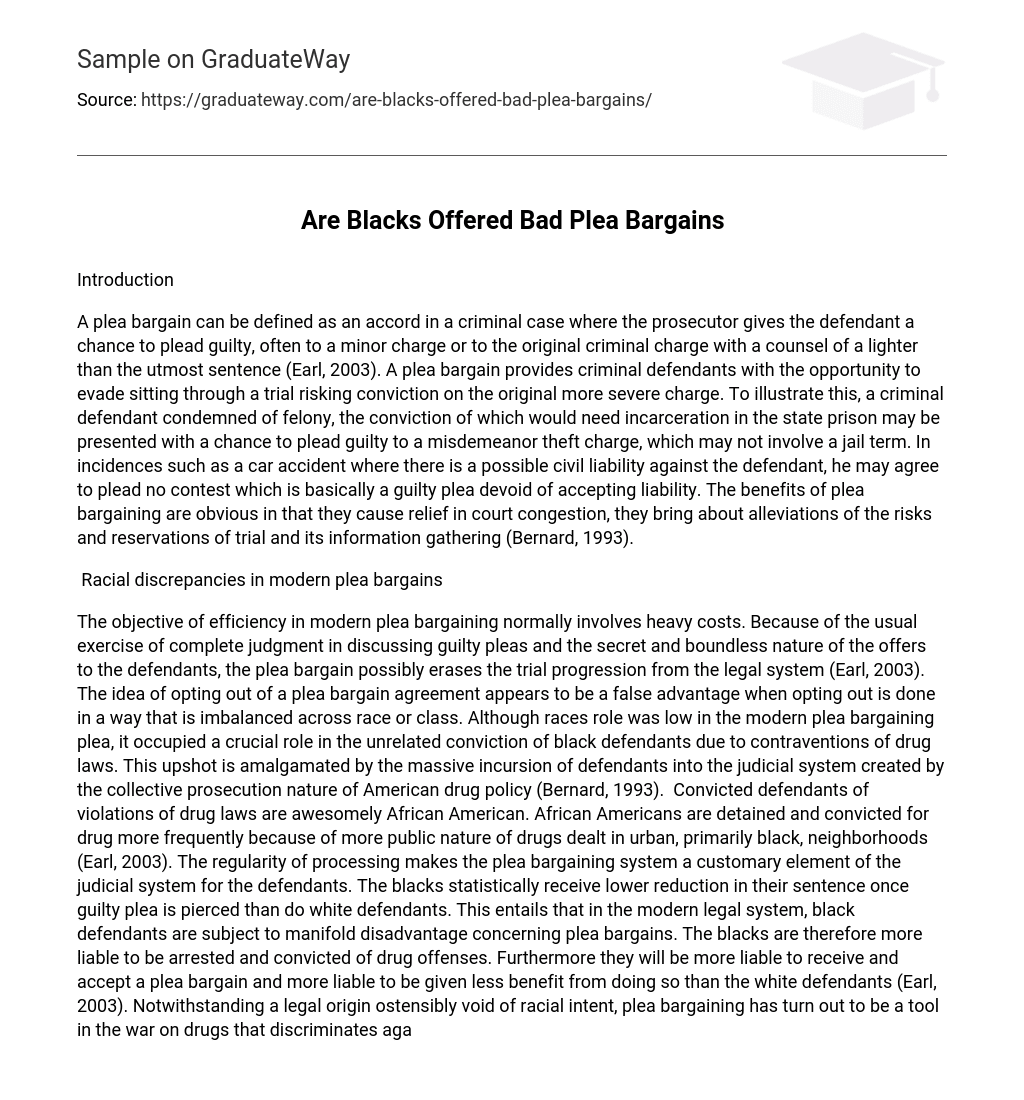Introduction
A plea bargain can be defined as an accord in a criminal case where the prosecutor gives the defendant a chance to plead guilty, often to a minor charge or to the original criminal charge with a counsel of a lighter than the utmost sentence (Earl, 2003). A plea bargain provides criminal defendants with the opportunity to evade sitting through a trial risking conviction on the original more severe charge. To illustrate this, a criminal defendant condemned of felony, the conviction of which would need incarceration in the state prison may be presented with a chance to plead guilty to a misdemeanor theft charge, which may not involve a jail term. In incidences such as a car accident where there is a possible civil liability against the defendant, he may agree to plead no contest which is basically a guilty plea devoid of accepting liability. The benefits of plea bargaining are obvious in that they cause relief in court congestion, they bring about alleviations of the risks and reservations of trial and its information gathering (Bernard, 1993).
Racial discrepancies in modern plea bargains
The objective of efficiency in modern plea bargaining normally involves heavy costs. Because of the usual exercise of complete judgment in discussing guilty pleas and the secret and boundless nature of the offers to the defendants, the plea bargain possibly erases the trial progression from the legal system (Earl, 2003). The idea of opting out of a plea bargain agreement appears to be a false advantage when opting out is done in a way that is imbalanced across race or class. Although races role was low in the modern plea bargaining plea, it occupied a crucial role in the unrelated conviction of black defendants due to contraventions of drug laws. This upshot is amalgamated by the massive incursion of defendants into the judicial system created by the collective prosecution nature of American drug policy (Bernard, 1993). Convicted defendants of violations of drug laws are awesomely African American. African Americans are detained and convicted for drug more frequently because of more public nature of drugs dealt in urban, primarily black, neighborhoods (Earl, 2003). The regularity of processing makes the plea bargaining system a customary element of the judicial system for the defendants. The blacks statistically receive lower reduction in their sentence once guilty plea is pierced than do white defendants. This entails that in the modern legal system, black defendants are subject to manifold disadvantage concerning plea bargains. The blacks are therefore more liable to be arrested and convicted of drug offenses. Furthermore they will be more liable to receive and accept a plea bargain and more liable to be given less benefit from doing so than the white defendants (Earl, 2003). Notwithstanding a legal origin ostensibly void of racial intent, plea bargaining has turn out to be a tool in the war on drugs that discriminates against blacks. White offenders in Florida are almost 50% more probable than blacks to obtain a hold back of arbitration, a plea deal that blocks their felony convictions albeit they plead to the crime. White Hispanics are 31% more probable to a hold back (Bernard, 1993). The disparity in the effects has cost thousands of black offenders their civil rights, including the right to serve on juries, right to vote, own a firearm and hold a public office. The convictions carry an economic penalty. The felons cannot be hired for many government jobs and they cannot apply for some student loans.
Conclusion
Some legal scholars dispute that plea bargaining is unconstitutional because it deprives person’s right to a trial by judges. In actual fact the defendant has an absolute, inexpert right to compel the State to investigate its own case, find its own eyewitnesses, and prove its facts and convincing the judges all the way through its own resources (Earl, 2003). During the development, defendant has elementary right to remain silent, in effect demanding the State at each point to prove it. Through limiting the powers of the prosecutors and police, the bill of Rights safeguards freedom (Earl, 2003)
Plea bargaining is also condemned, predominantly outside the US, on the justification that its close association with rewards, threats and coercion probably jeopardizes the correct legal upshot (Bernard, 1993). Coercive plea bargaining has been condemned on the aspect that it intrudes an individual’s rights under Article 8 of the UK’s Human Rights Act of 1998.
References
Bernard, B (1993). The Debate on the Constitution. New York: New York University Press
Earl, M (2003). The Civil Rights, the Constitution and Congress. London: London University
Press





